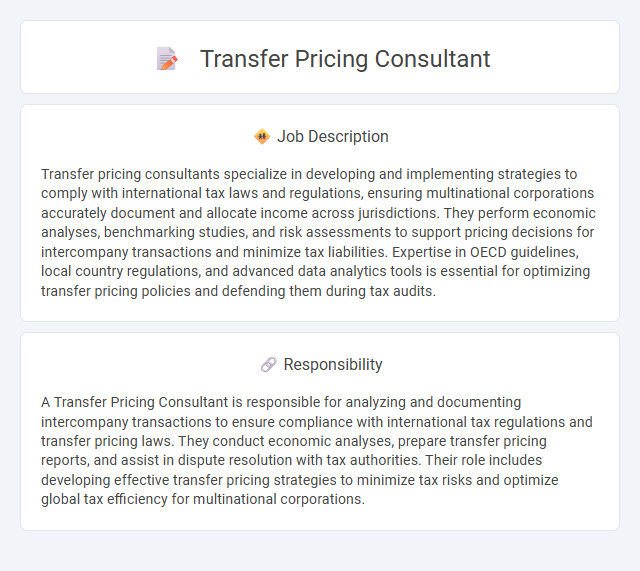
Transfer pricing consultants specialize in developing and implementing strategies to comply with international tax laws and regulations, ensuring multinational corporations accurately document and allocate income across jurisdictions. They perform economic analyses, benchmarking studies, and risk assessments to support pricing decisions for intercompany transactions and minimize tax liabilities. Expertise in OECD guidelines, local country regulations, and advanced data analytics tools is essential for optimizing transfer pricing policies and defending them during tax audits.
Individuals with strong analytical skills and a keen eye for detail are likely well-suited for a transfer pricing consultant role, as the job demands precision in evaluating complex financial data and regulatory frameworks. People comfortable with working under pressure and navigating intricate tax laws may find this position aligns with their strengths. Those who prefer routine tasks or lack interest in cross-border taxation might struggle to thrive in this dynamic consultancy environment.
Qualification
A Transfer Pricing Consultant typically holds a degree in accounting, finance, economics, or law, often complemented by certifications such as CPA, ACCA, or CFA. Expertise in international tax regulations, OECD guidelines, and financial analysis is essential for effective transfer pricing strategy development and compliance. Strong analytical skills and proficiency in data modeling tools are critical qualifications to succeed in this role.
Responsibility
A Transfer Pricing Consultant is responsible for analyzing and documenting intercompany transactions to ensure compliance with international tax regulations and transfer pricing laws. They conduct economic analyses, prepare transfer pricing reports, and assist in dispute resolution with tax authorities. Their role includes developing effective transfer pricing strategies to minimize tax risks and optimize global tax efficiency for multinational corporations.
Benefit
A Transfer Pricing Consultant likely offers significant benefits by ensuring multinational companies comply with international tax laws, reducing the risk of costly audits and penalties. They probably optimize intercompany transactions to enhance tax efficiency and improve overall financial performance. Employing their expertise might lead to improved regulatory compliance and strategic tax planning.
Challenge
Transfer pricing consultants likely face complex regulatory environments that require constant adaptation to evolving international tax laws. They probably encounter challenges in balancing compliance with strategic financial goals across multinational entities. Navigating intricate documentation and audit processes is expected to demand high analytical and problem-solving skills.
Career Advancement
Transfer pricing consultants specialize in developing and implementing strategies that comply with global tax regulations while optimizing corporate profitability. Career advancement in this field is driven by gaining expertise in international tax laws, mastering financial analysis, and building strong client management skills. Progression often leads to senior advisory roles, project leadership, and opportunities in global tax strategy development within multinational corporations or consulting firms.
 kuljobs.com
kuljobs.com